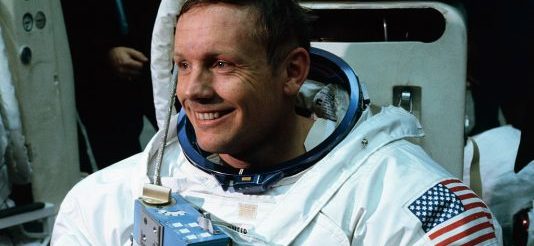National Pride Drives Human Innovation in Space

The new Ryan Gosling film, “First Man,” slated for release on October 12 of this year is already garnering a high amount of criticism from those on the Right. The film is a biopic about the Apollo Moon Landing, with Gosling starring as astronaut Neil Armstrong, the first man to walk on the moon. The criticism has arisen from a brief scene which fails to show the American flag planted on the moon. When pressed by a retinue of Right-wing notables—such as Florida Senator Marco Rubio—as to why the film omitted such an important symbol, Gosling replied:
I think [the Apollo Moon Landings were] widely regarded in the end as a human achievement [and] that’s how we chose to view it. I also think Neil [Armstrong] was extremely humble, as were many of these astronauts, and time and again he deferred the focus from himself to the 400,000 people who made the mission possible . . . I don’t think Neil viewed himself as an American hero. From my interviews with his family and people that knew him, it was quite the opposite. And [the filmmakers] wanted the film to reflect Neil.
Much of what Gosling argued is true. Despite the Apollo program having been a singular American feat, in the end, many of the participants—and most people alive today—view those landings as a shared human experience. This is compounded by the fact that the moon landings were televised around the world. It is also true that many of the NASA astronauts—then and now—routinely defer whatever plaudits they may garner for their work in public over to the folks at mission control and throughout NASA, who make their missions possible.
That said, there is much about Gosling’s statement that is flat-out wrong. According to Neil Armstrong’s colleague, the great U.S. Air Force General Chuck Yeager (ret.), Armstrong was far from an America-bashing globalist.
That’s not the Neil Armstrong I knew
Armstrong wasn’t very humble, either. He did, after all, pull rank on his pilot, Buzz Aldrin, when they landed on the moon, to ensure that his name, rather than Aldrin’s, was forever remembered as the first man ever to set foot on the moon.
What Gosling (and others) fail to appreciate is the fact that the Apollo mission was an American endeavor. American taxpayers funded the program and American astronauts and equipment were used. More important, the mission did not transcend national boundaries any more than the Spanish colonization of the New World did in the 15th century. Let’s not forget that NASA was staffed by many U.S. military personnel, such as Neil Armstrong and Chuck Yeager. While most people today view the Moon landings as a shared human victory, it was first-and-foremost an American victory in the terrifying saga that was the Cold War.
If NASA viewed itself as representing human interests as opposed American national interests, the Apollo program (if you’ll pardon the expression) never would have gotten off the ground. Fear of Communists possessing superior capabilities to access space (and, potentially, place weapons in orbit or on the moon, thereby threatening the United States) is what thrust those heroic American astronauts into space. Senator Rubio is quite right when he admonished Gosling that the Apollo Program was not “a U.N. mission.”
This isn’t to say that the entire human race shouldn’t applaud the accomplishments of NASA or revel in the bounties that NASA’s innovation has provided. It is important to bear in mind, however, the supposed mundane nature of our national interests are, actually, quite necessary in compelling space exploration. Going forward, this understanding will be important for NASA and the overall American space community.
Since the end of the Cold War, NASA has lacked vision. This loss of pride in America’s national purpose probably has something to do with this. Whereas the United States once propelled itself to new worlds in search of new things—and in order to beat out the Red Menace!—that impetus vanished when the Soviet Union collapsed. Since then, NASA has done little more than hang out in low-earth orbit and take cool snapshots of distant worlds and galaxies. Yes, we still learn and we still expand all of humanity’s vision. But, strategic and competitive purpose is more important in driving curiosity and innovation.
Physicist, Neil deGrasse Tyson, has argued that one doesn’t need a national military threat to have a cogent space policy. Judging from recent history, however, it would appear that pursuing the national interest is a core component to marrying up ends-ways-means with the necessary “wow” factor of the space program. Today, the United States faces challenges from China similar to those it faced from the Soviet Union of yesteryear. Without a reliable space policy, the United States will fall behind its strategic competitors—just as the French and Spanish Empires ultimately fell behind their British rivals after they lost their territories in the New World.
Ryan Gosling’s comments fall flat in the end. We can never forget how important the national interest is for our space program—or any national program—to succeed. America’s role in space should be celebrated, not diminished. The next wave of human space exploration is waiting to occur. It will only happen if the right incentives are offered and those incentives are the same today as they were in the first Space race.
Content created by the Center for American Greatness, Inc. is available without charge to any eligible news publisher that can provide a significant audience. For licensing opportunities for our original content, please contact [email protected].
